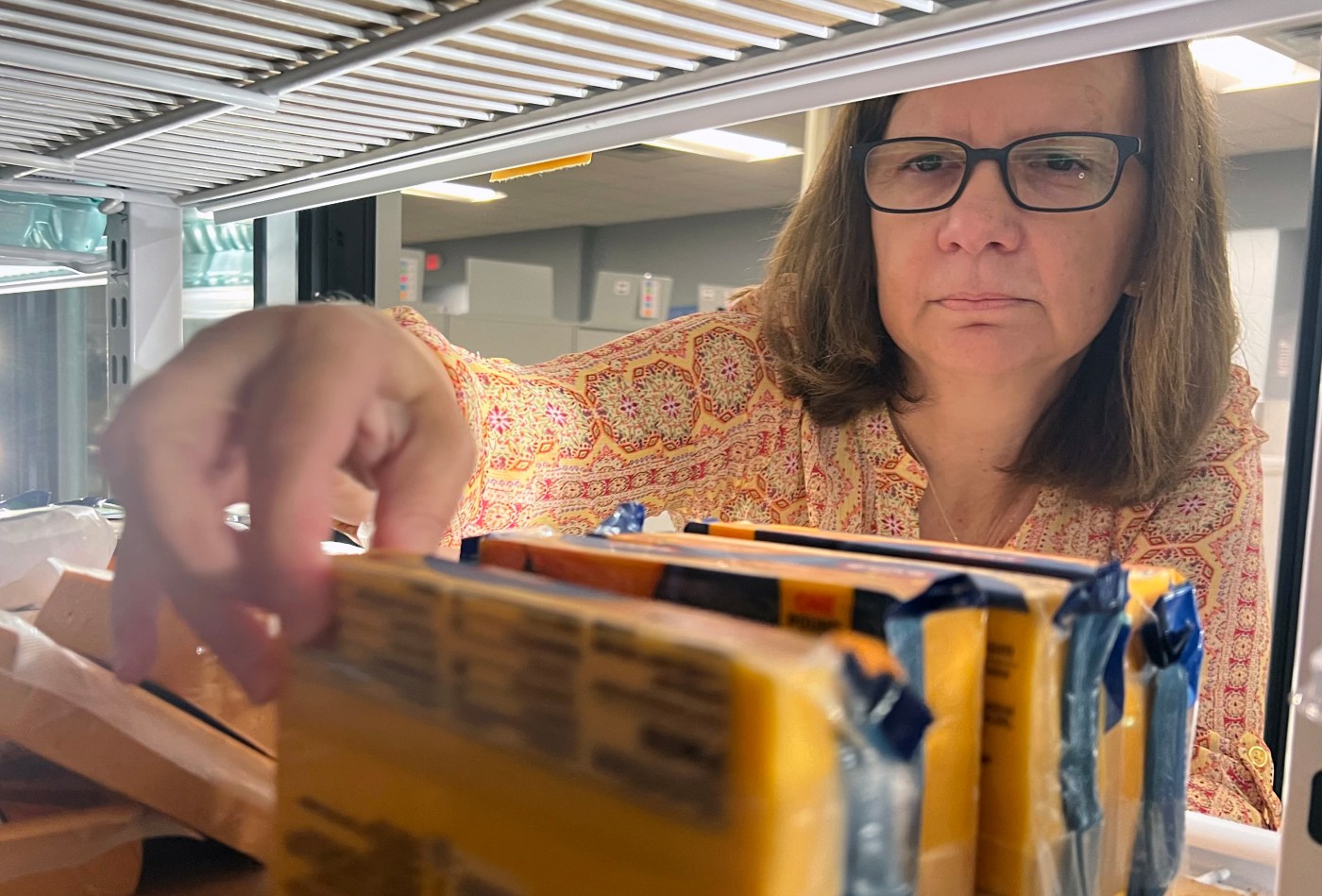
St. Paul Park food shelf receives Marathon Oil donation to pay off mortgage
Michelle Rageth and Jill Hughes looked across a St. Paul Park warehouse Thursday afternoon, pointing out the various amenities of Friends in Need Food Shelf.
It calls to mind a grocery co-op more than a traditional food shelf. They pointed out the large grocery area. The walk-in freezer. The dry goods storage area and the dairy refrigerator section. The pair got to the square, generously-sized welcome desk in the lobby and paused.
“We were once trying to sort our groceries in a room that was smaller than that desk,” said Rageth, who retired as Friends in Need executive director at the beginning of 2024, completing a 25-year run with the nonprofit.
On Thursday, Friends In Need employees and volunteers received a donation of $98,750 from Marathon Oil’s St. Paul Park Refining Company, capping off more than $1 million in donations made by the refinery to the food shelf since 2015. Thursday’s payment fulfilled the mortgage on the property and 12,000-square foot facility.
“It’s just unbelievable,” said Hughes, current executive director of the food shelf. She started with Friends in Need as assistant director seven years ago. “We would not be here without the refinery.”
The current Friends in Need space opened in 2016 and serves 225 to 250 families a week, which has increased some 40 percent since last year, according to food shelf officials. Every Tuesday morning, a semitrailer full of food arrives with new inventory.
Due to its large space, Friends in Need can operate with a “choice” model, where clients can come into the food shelf, grab a cart and pick out what items they need, similar to how they would shop at a supermarket. The shelf labels foods by color code, as well, removing a potential language barrier for their clients.
Friends in Need counts two paid employees — executive director Hughes and assistant director Crystal Schneider — but otherwise operates through the help of 175 volunteers who put in 300 hours a week.
Many volunteers come from the refinery, and get to know the clients, Hughes said, creating a relaxed atmosphere. That helps remove any stigma inside the food shelf’s doors.
“It’s like a family here, and that makes a hard situation for people a little bit better,” Hughes said.
Increased demand
The “choice” option is generally the preferred model among hunger relief organizations, Second Harvest Heartland Director of Community Partnerships Angelica Klebsch said.
Related Articles
I-94 eastbound will remain open this weekend, but road work will close MN 36 westbound in Roseville, Little Canada
St. Paul: Shepard/Warner Road to reopen Wednesday
St. Paul’s Union Depot to host food truck festival this weekend
The Minnesota State Fair is looking for workers, will hold a job fair July 24
Rubén Rosario, New York crime reporter, Pioneer Press columnist and journalism mentor, dies at 70
Second Harvest Heartland, in partnership with more than 1,000 food shelves and donation programs, provided almost 128 million meals to neighbors in Minnesota and western Wisconsin last year.
The choice model offers clients a friendly space with dignity, she said.
As Friends in Need has witnessed greater needs this year, food insecurity rates continue to rise statewide, as well. Second Harvest Heartland has distributed 15 percent more food in each of the past three years.
According to Hunger Solutions Minnesota, a food equity nonprofit, Minnesotans made more than 7.5 million visits to food shelves in 2023, more than 2 million more visits than in 2022. It was a record high for the third consecutive year.
Their own space
Many food shelf operators are located within the space of another organization such as another nonprofit or a church, Klebsch said.
Such was the situation for Friends in Need back in 2015. They were operating out of a former VFW location that badly needed repair.
“Our needs kept growing, but the building kept getting older,” Rageth said. “It was so old, the city of St. Paul Park did not even know when it was built.”
Stakeholders from Friends in Need and volunteers linked to the St. Paul Park Refining Company began researching possible solutions. They thought about trying to once again renovate the property, but that proved unrealistic, said Jason Akey, a Marathon Oil technologist, who helped the search for a more permanent space. Akey also previously served as a Friends In Need board member.
Pictured (from left) at the grocery portion of the Friends in Need food shelf in St. Paul Park food shelf are: Crystal Schneider, Friends in Need assistant director; Jill Hughes, Friends in Need executive director; Jason Akey, Marathon Petroleum technologist and former Friends in Need board member; Holly Jackson, Marathon Oil St. Paul Park refinery plant general manager; and Michelle Rageth, retired Friends in Need executive director. Thursday’s donation capped off nine years of work to secure a new location for Friends in Need, which fulfilled the mortgage on the property and 12,000-square foot facility. (Elliot Mann / Pioneer Press)
“If you had ever seen the old VFW they were operating out of, it was atrocious,” Akey recalled.
They toured other sites where the food shelf might be able to rent space, but they kept coming up empty. Eventually, Akey said, the group decided to approach the refinery leadership with a different option.
St. Paul Park Refining Company would sell a plot of land for $1 and provide money to build the new facility. The food shelf now sits in the shadow of the refinery and across the street from the old food shelf location, which has since been reduced to a parking lot.
The refinery itself has changed hands several times since 2015, with Marathon Oil reacquiring it in 2018. But continuing the relationship and honoring the previous commitment between the refinery and the food shelf was important, said Holly Jackson, Marathon Oil St. Paul Park refinery plant general manager.
For Rageth, the refinery community members have always had a hand in ensuring the food shelf kept its doors open.
“This is the nicest food shelf I’ve ever been to,” Rageth said. “We never dreamed that we would be able to give this type of experience to our community.”
Related Articles
Deputies search ex-boyfriend’s residence in case of missing Dakota County woman
Faribault man sentenced to nearly 9 years for shooting, wounding Burnsville man he thought was seeing his ex-girlfriend
For all your camel-riding needs: Middle Eastern Festival to take place in West St. Paul on July 13-14
Dakota County Board selects first woman to serve in county’s top role
After 100 years, Dakota County dam upgrade expected to double hydropower output


